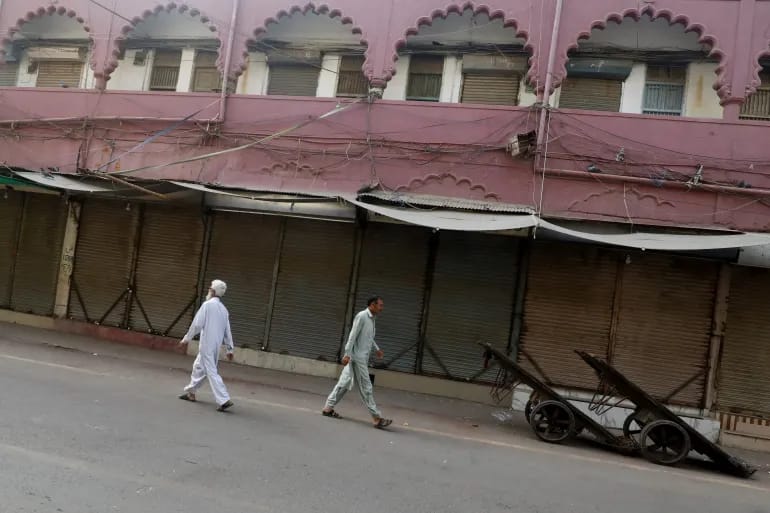In a massive show of solidarity, traders across Pakistan have launched a nationwide shutdown, closing markets in major cities like Lahore, Karachi, and Peshawar. The streets were lined with shops displaying placards condemning the “unreasonable increase in electricity bills and taxes,” as thousands of traders vented their frustrations over skyrocketing energy and fuel costs. This widespread discontent has gripped the nation just months before crucial national elections, putting immense pressure on the government to address the concerns of the traders while adhering to stringent austerity measures imposed by the International Monetary Fund (IMF).
Traders Unite in Protest
Traders from all walks of life have joined hands to demand immediate relief from the crippling economic burdens they face. Lahore’s Township Traders Union president, Ajmal Hashmi, voiced the sentiments of many when he stated, “Everyone is participating because the situation has become unbearable now. Some relief must be given so people can put food on the table.” The soaring costs of energy and fuel have made it increasingly difficult for ordinary Pakistanis to make ends meet, igniting a sense of urgency among traders to take action.
Economic Challenges and IMF Austerity
Decades of economic mismanagement and instability have left Pakistan’s economy in dire straits. To secure much-needed financial assistance, Pakistan entered into an agreement with the IMF, which necessitated slashing popular subsidies that had previously cushioned the impact of rising living costs. This move resulted in a sharp increase in petrol and electricity prices, pushing them to unprecedented levels. The government, led by caretaker Prime Minister Anwaar-ul-Haq Kakar, defended the decision, emphasizing that there is no “second option” other than making citizens bear the brunt of these economic challenges. Kakar stated, “When you subsidize, you shift your fiscal obligations to the future. Rather than addressing the issue, you just delay it.”
Growing Discontent and Political Turmoil
As the bills for electricity and fuel continue to surge, Pakistanis are grappling with a staggering year-on-year inflation rate of 27.4 percent in August, with motor fuel costs rising by eight percent in July alone. Many traders are finding that their earnings are no longer sufficient to cover these mounting expenses. Babar Mahmood, president of the Electronics Market Traders Union in Lahore, lamented, “The bills we have received this month exceed our earnings.” This economic turmoil has created a palpable disconnect between the general public and those in positions of power.
The current caretaker government has been overseeing Pakistan since parliament’s dissolution last month, tasked with organizing upcoming elections. However, the election date remains unannounced. The interim leadership, along with the terms of the IMF agreement, were negotiated during the tenure of previous Prime Minister Shehbaz Sharif, who led a fragile coalition government in its efforts to revive the economy after the removal of Imran Khan in 2022. Khan, the nation’s most popular politician, is currently in prison facing a slew of legal cases that he believes are designed to prevent him from participating in the forthcoming polls.















